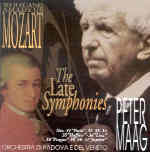Listeners who enjoyed Peter Maag’s vital and musicianly Beethoven symphony cycle will find similarly uplifting qualities throughout his traversals of Mozart’s late symphonies. The chamber-like dimensions of Maag’s orchestra allow for unusually clear and forwardly balanced winds and brass along with the textural lightness, punchy accents, and assertive timpani whacks characteristic of many period-instrument Mozart performances on disc. At the same time, Maag takes every opportunity he can for his small, slightly undernourished string section to sing out with full operatic vibrancy (especially in unaccompanied unison passages).
Just a few of many examples demonstrate Maag’s aesthetic rightness and care with detail: the B-flat K. 319 symphony’s delicate canonic interplay in the slow movement; the magical transitions he effects between the introductory Adagios and opening Allegros in the first movements of the “Prague” and E-flat K. 543; the subtle inflections gracing the G minor K. 550’s slow movement; and the crisp specificity with which the “Jupiter” symphony’s polyphonic finale unravels and builds. Occasional ensemble and solo blemishes are inconsequential in light of the intensity and commitment informing each and every bar. Given the vivid impact of Arts Music’s engineering and the label’s modest asking price, Maag’s Mozart virtually recommends itself. Welcome it into your library without delay.
































